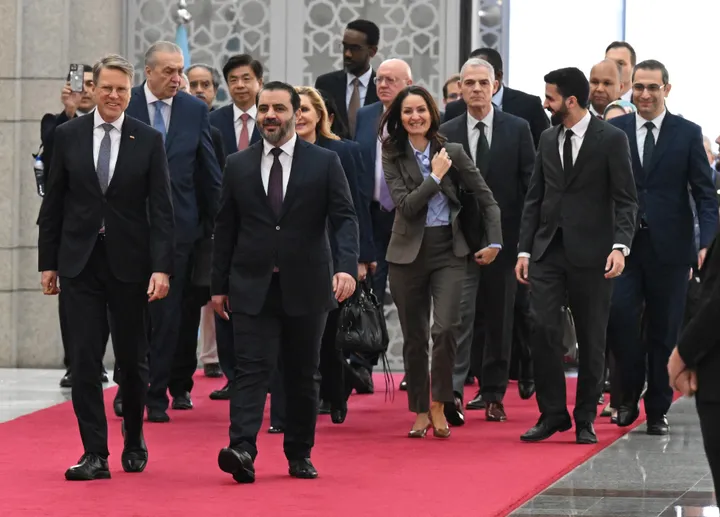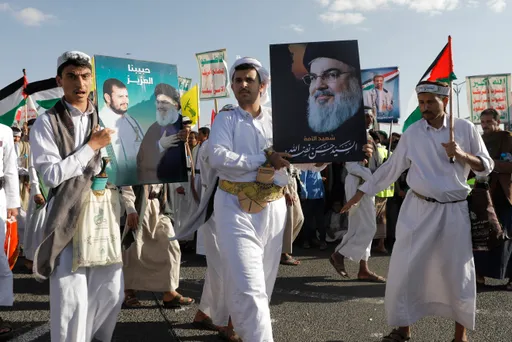When it comes to civil wars around the world, and especially in the Middle East and North Africa, the attention of the security bureaucracy is drawn to "foreign fighters" joining insurgent groups.
The debate ranges from the question of how to prevent them from reaching the region to whether the trauma and violence they experience in the war environment will be carried with them upon their return home.
Despite these concerns, Israel is one country in the Middle East where global volunteer recruitment is carried out without anyone batting an eyelid.
Following the shock created by Hamas’ October 7 attack and the Netanyahu government’s insistence on waging a full-fledged war, 360,000 Israeli reservists from across the world responded immediately, leaving their jobs and university education.
Mobilising transnational volunteers
The history of foreign recruitment can be traced back to the early days of the foundation of the state of Israel.
The Israeli army established the ‘Volunteers from Abroad’ (MACHAL) unit, which helped the development of the air defence system.
As a result of the efforts of the Zionist movement and the Haganah group (the armed wing of the Jewish Agency for Palestine), approximately 4,700 people from 56 countries participated in the 1948 war against the Arab countries for the establishment of Israel on Palestinian territories.
Military service became compulsory for Israelis when they turned 18. Men must serve 32 months and women 24. It’s after this that they join the reserve units until the age of 40, when they can be called in case of national emergency, such as the Arab-Israeli War of 1967, the Yom Kippur War in 1973, the Gulf War in 1991, and, of course, in Gaza after October 7.
Global Zionism in practice
Israel is the only state in the region that is ideologically indoctrinating both its citizens living inside Israel and outside of the country systematically. This is also possible since becoming a citizen of Israel is defined too broadly for Jewish origins. This can be seen in an answer given to the question: “Can a non-Jew volunteer with the IDF (Israeli army)?”:
"If at least one of your grandparents or your parents is Jewish, or if you are married to a Jew and they live in Israel, you can still volunteer even if you are not Jewish according to Jewish law (unless your mother is Jewish)."
Although most of the reservists who joined the war on Gaza currently live in Israel, some internationals responded positively. Israeli soldiers of French nationality have not hesitated to mock the personal belongings of Palestinian women evicted from their homes.
At the same time, the daily lives of British citizens participating in the massacre in Gaza are publicly available on social media. Then there’s footage taken on the fifth day of Israel's declaration of war showing a plane of passengers traveling from Peru to Israel declaring their support for the war by waving Israeli flags.
Disillusionment rises among reservists
The integration and enlistment problems experienced by soldiers should be underlined.
It would be a mistake to assume that reservists are immune to what has been happening in Israel for the last couple of years: political unrest combined with street protests against the government, as well as raids in the occupied West Bank in 2022-23. Frequent mobilisation of reservist forces has led to frustration among the rank and file.
In July last year, up to 10,000 reservists signed a public letter against judicial reforms in Israel and threatened to refuse duty.
As the war continues and opposition grows against the government policies regarding the release of hostages held by Hamas, the morale and will of soldiers to continue this campaign will decrease swiftly.
The conditions of reservists are not only a concern of Israeli domestic politics or criticism of conditions and lack of equipment provided to them on the ground. Israeli soldiers are now on the verge of what post-Vietnam War veterans lived through in the United States.
Christian Appy, professor of History at the University of Massachusetts Amherst and author of three books on Vietnam, summarised the fate of Vietnam vets as “They were not necessarily looking for a parade, but they were certainly looking for basic human support and help in readjusting to civilian life after this fierce war.”
Security challenges of ‘returnees’
Even though the people recruited by Israel receive active combat training and take part in conflicts in different positions, they are never tarred with the “radicalisation” label attributed to the illegal volunteers, as is the case in other disputes.
The international security complex perceives those ideologically indoctrinated individuals with the motivation of waging “Jihad” to travel to different parts of the world, such as Afghanistan, Syria, or Somalia, as a threat.
“Jihadis” were not allowed by their country of citizenship/residence to join in “somebody else’s war” and were seen as a security concern in case they returned radicalised and traumatised by war experience. There is always a high probability of chance for those who experience an ideologised war to "bring the war home with them" by resorting to violence toward those who support the very "enemy" they are fighting.
The same case applies to those fighting for the name of Zionism. Of course, there is a range in the spectrum of the effects and actions of returnees from the war in Gaza. Some returnee reservists would be welcomed by the universities as guest speakers to share their experiences. Others might resort to violence against the peaceful pro-Palestine protesters and spread fear.
In recent weeks, the South African Foreign Ministry has made a statement that its citizens who fought on the side of Israel will be prosecuted upon their return to their country, but this is not yet a universally accepted practice.
For this to happen, international organisations such as the United Nations and the domestic legal remedies of the second countries of which the Israeli soldiers are citizens must be brought to the agenda as well.
This is not only a legal debate summarised as whether a citizen can fight in another country's war and commit acts of genocide but also a situation that may threaten social peace and security. As solidarity with Palestine is increasing significantly on university campuses, security measures should be included to prevent attacks on peaceful protestors by “returnee” Israeli reservist soldiers.
























